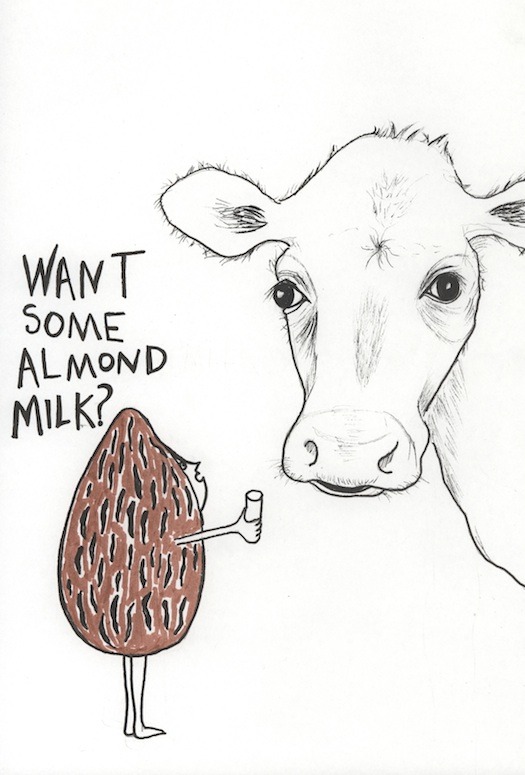
By Leslie Goldberg
Wouldn’t you know it? It’s the health food freaks, the almond milk guzzlers who are fueling California’s water shortage. Did you know that it takes a whole gallon of water to raise one almond?
A whole gallon.
Those self-righteous vegans who think they know something!
Since I happened to have a pound of almonds in the refrigerator I decided to count up those little water suckers and see how much water it takes to produce a pound of almonds. It was bad. Four hundred and thirty-three gallons of water.
Four hundred and thirty-three? Wait a minute. How about a pound of beef? (I dare say it’s a lot easier to eat a pound of beef than it is to eat a pound of almonds.) According to the folks at waterfootprint.org it takes between 3,000 and 5,000 gallons of water to produce one pound of beef.
“More than half the entire US water supply goes to livestock,” says the Center for Science in the Public Interest.
“It takes a lot of water to grow grain, forage, and roughage to feed a cow, as well as water to drink and to service the cow,” says the US Geological Survey Water Science School.
“Meat processing, especially chicken, also uses large amounts of water,” says the Environmental Working Group.
“The more plant-based foods we eat versus animal-based foods….the less water, energy, and other natural resources we use,” says the San Francisco Water Sewer.
Oh.
If animal foods are such a big deal in terms of water usage, why, why, why did the New York Times, in their recent mega two-part series on California’s drought, not mention animal foods? Why did they instead focus on the water required to grow almonds?
I have four suspicions.
1) The reporters, like practically everyone on the planet, consider animal food eating “normal, natural and necessary.” (Thank you author of “Why we Love Dogs, Eat Pigs and Wear Cows,” Melanie Joy.)
2) They consider almonds to be maybe normal and natural, but definitely not necessary.
3) It’s kind of a sexy angle to zero in on almonds – almonds seem so innocent, but now we find they’re evil. (“Hey! Did you read this? It’s almonds that are using up all our water.”)
4) Pressure from the animal food industry, particularly the dairy farms which have been facing a serious challenge from the almond milk industry.
One of the big things The New York Times drought stories didn’t mention was water pollution, which by the way, is a rather large water suck. Turns out, according to the EPA, the animal foods industry is THE biggest cause of water pollution in the United States.
California’s Central Valley, which is dominated by huge dairy farms, has suffered serious ground water pollution caused primarily by cow waste. A study by the central valley water board found that 40 percent of the dairies in that area – more than 550 facilities – reported that they had nitrate levels in their own wells of at least twice the drinking water standard and it’s become a health threat to those who have the misfortune of living nearby, especially babies and pregnant women.
No, the Brita won’t take out nitrates.
Also I have to say, that’s an interesting concept: “their own wells.”
When it comes to water pollution, nobody’s talking about almonds as far as I can tell. Still, California is producing a lot of almonds, most of which are exported abroad. I’ve read that 10 percent of California’s water supply is going to raise almonds. And 47 percent of California’s water is going to livestock, according to a December 2012 report by the Pacific Institute, titled “California’s Water Footprint.”
I won’t say whether anybody should drink almond milk or not. I will say, though, people should eat (one of my favorites) lentils instead of meat.
“By making one meal a week with lentils instead of beef, a family of four can save the equivalent of 17 bathtubs of water,” says Oxfam International.
Seventeen bathtubs. One meal.
PS: Despite the holes in their story, the New York Times reporters do deserve some credit though for finding possibly the most intellectually challenged man in the entire state to give his reaction on the water crisis: “I’m not going to stop watering,” said Matthew Post, 45, referring to the gardens around his Benedict Canyon home. “The state does not know how to arrange the resources they have, and so we have to pay for it,” he said. “They say that they will raise the prices because there is a drought, but when the drought ends, will they reduce the prices?”
Ok, fine, Mat, but how about cutting down on the burgers?
– A Vicious Vegan blog post –
